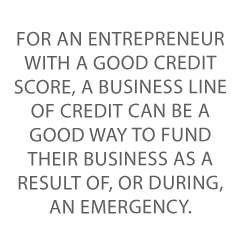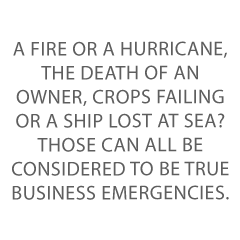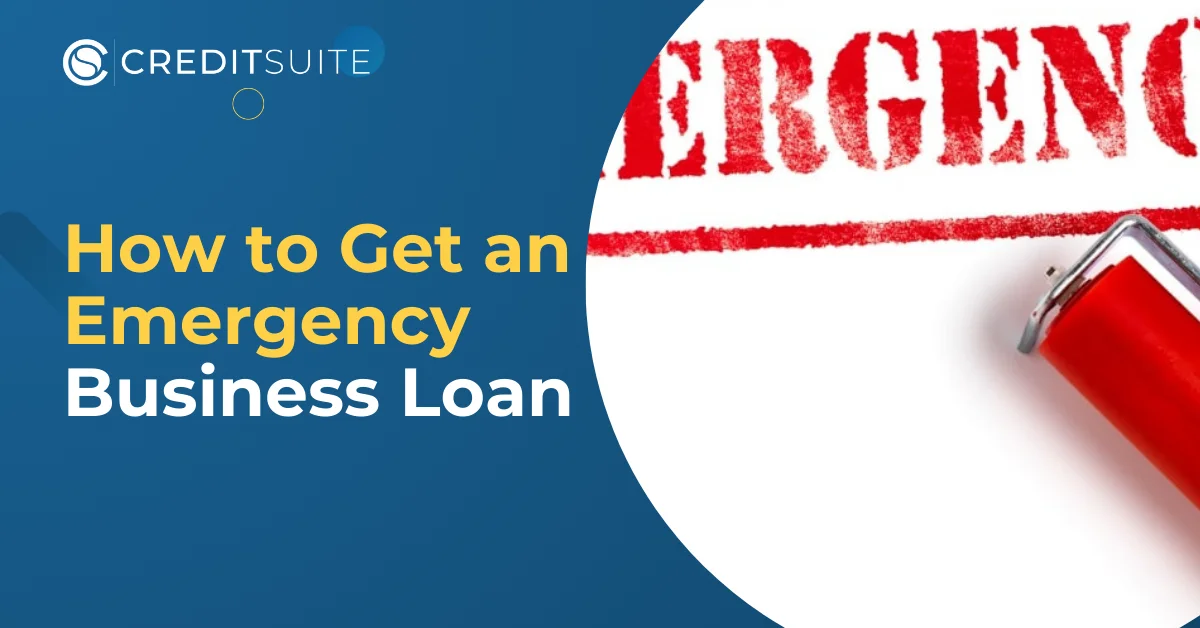Are you looking for an emergency business loan? Any small business can find itself in a sticky situation where they need financing ASAP. But where can a small business owner find fast funding?
Your options will depend on how quickly your small business needs an emergency loan. They will also depend on your Fundability™. We’ll get to that later
This blog post may contain affiliate links, meaning when you click the links for some products and make a purchase, Credit Suite receives a commission at no additional cost to you.
Emergency Business Loan Types
Type 1 – Credit Line Hybrid
The Credit Suite Credit Line Hybrid is a great way for a business to get fast financing and leverage an owner’s good personal credit scores. You can get up to $150,000 in unsecured credit cards.
You will have to have at least a 700 FICO score to qualify for the Credit Line Hybrid. Get 24-hour preapproval. Even startup businesses can qualify for this form of financing.
You will have to have a credit card for at least three years, with a $5,000 limit or better. This must be a primary card. Have at least two open revolving accounts with a year and a half of good payment history.
Utilization must be under 40% on all revolving accounts, and no more than four unsecured accounts opened in the past twelve months.
Pros
This program is essential ‘no doc’. Credit Suite’s lending partners will not ask for financials, bank statements, business plans, resumes, or any of the other burdensome document requests that most conventional lenders demand regular business loans.
Cons
You or a credit partner will need to have good credit. Go from application to funding in three weeks or less, which may be too slow in some instances.
Type 2 – Merchant Cash Advances
A merchant cash advance is essentially a way to use your incoming credit card sales as leverage to get small business financing. If your business has consistent credit card sales, then this is an option for emergency lending.
Often, you will pay for this type of financing with a deduction taken straight from your business accounts.
Pros
The main thing that a lender will want to see is whether the companies where you have as-yet uncollected credit card sales are reliable when it comes to payments. If so, then you can get approval for a merchant cash advance.
The lender probably won’t need much in the way of additional information.
The beauty of this is that bad credit, even in the 500s (on your part, not the company owing you money) is not going to be a problem. MCAs are an ideal choice for small businesses where ownership has poor credit.
Cons
It’s a short loan term. Also, an MCA will always have a high-interest rate. But in a way, that makes sense. The lender wants proof that you will pay them back. In the absence of good personal credit, they will get their assurance via higher interest.
Type 3 – Economic Injury Disaster Loan from the SBA
The Small Business Administration grants relief in the form of loan assistance.
You can only apply for this type of SBA loan if your small business is in a declared disaster area. Also, you must submit the completed loan application and a signed and dated IRS Form 4506-C giving permission for the IRS to provide SBA with your tax return information.
Pros
You can get up to $2 million in working capital with this form of financial assistance.
The money is to help your small business meet financial obligations and operating expenses that could have been met had the disaster not occurred. It is even possible for small businesses to qualify for both an EIDL and a physical SBA disaster loan.
Your loan amount will be based on your actual economic injury and your company’s financial needs, regardless of whether the business suffered any property damage.
This is a term loan although the term will not exceed 30 years. The SBA offers low-interest loans. In this case, rates are 4% or less.
Cons
Unlike with the Paycheck Protection program, loan forgiveness is a lot less likely. These are not grants. However, like a PPP loan, there are some restrictions as to usage. In general, this is a business loan intended to make your business whole again after a catastrophe.
Type 4 – If You Qualify, Get a Business Line of Credit
 For an entrepreneur with a good credit score, a business line of credit can be a good way to fund their business as a result of, or during, an emergency.
For an entrepreneur with a good credit score, a business line of credit can be a good way to fund their business as a result of, or during, an emergency.
Online lenders (like Fora Financial) will be more likely to approve and even furnish business lines of credit within 24 hours or less, versus a more traditional business loan provider.
Many providers only want a brief connection to your business’s financial software (an app or a program such as QuickBooks).
But even offline providers may be able to get cash to your business quickly.
Pros
This form of emergency business funding works a lot like a credit card. You will not have to pay interest on the entire loan amount—only on whatever you are using at the time. Replenish the fund (that is, pay back the loan), and the money is available again
Because of this flexibility, this is a great way for small businesses to cover cash flow shortfalls and meet payroll costs.
Cons
You will need a good credit score and may have to put up collateral. An entrepreneur with poor personal credit scores will most likely be shut out from this form of business financing unless they can secure the business line of credit with substantial collateral.
Type 5 – Use a Business Credit Card
Business credit cards have higher limits than personal ones, and an emergency is more or less what they are made for. You will control how much you spend. Like with any other form of credit, you can get goods and services immediately.
Since a cash advance can be expensive, the idea here is not to get one. Rather, it is to use your cards to pay for all the ancillary expenses you may have when recovering from an emergency, such as office cleaning or buying new computers.
Pros
If your card reports to the business credit reporting agencies, then you will be able to build business credit at the same time as your business recovers from a disaster. You can’t always do that with a regular business loan.
If your business and personal credit are split properly, then using your company credit cards will not adversely affect your personal credit score.
Cons
Like with all other forms of credit, if you do not pay on time, then you will be paying interest, and rates are high. But at least they aren’t as high as those for an MCA.
Also, even though the limits are better than those for personal credit cards, how much are we talking about here? A corporate credit card with a $100,000 limit will not be enough to rebuild a $1 million building. You’ll need additional resources to cover the costs.
Type 6 – Emergency Small Business Loan from a Traditional Provider
A standard term loan can be a good choice for funding after an emergency. But keep in mind that this kind of funding is likely to take more time than other options.
Pros
If you and your business have a good relationship with your bank, then it can be easier to get this form of business loan. This means keeping a decent balance, depositing more than you are withdrawing, and using several banking products.
It doesn’t hurt to have good personal and business credit, either.
Cons
Business owners will need to provide paperwork for this type of business loan. If the emergency wiped out, say, your older tax returns, it will be hard if not impossible to get this form of funding.
Banks and other traditional lenders (like credit unions) tend to be stricter with their requirements.
Also, this is virtually always going to be a term loan. That may very well be the only loan program that such a provider offers. As a result, you are paying interest on all of the funding, not just what you are using at the time.
Furthermore, if speed is an issue (say, you have to cover cash flow shortfalls right now), then this is probably not the best funding for you.
Emergency Business Loan Pitfalls
An emergency generally implies a rush. Because of the need for quick cash, you will have less time and opportunity to evaluate your choices. Getting funding fast will be a tradeoff against more prudent comparison shopping.
The need for speed will shut some types of business loans out completely. It is entirely possible that traditional lending will end up being too slow.
One of the prices of speed is higher interest. Another is your choice of a short-term loan, or less money available. And another is that there will be fe wer providers.
wer providers.
An entrepreneur should be careful about what he or she considers to be an actual, bona fide emergency. If you start to see every single minor economic problem or setback as an emergency, then you are bound to start making rash economic decisions.
A fire or a hurricane, the death of an owner, crops failing, or a ship lost at sea? Those can all be considered to be true business emergencies.
But the lean months for a seasonal business are not. You should know what you’re getting yourself into when you start a seasonal business, such as selling swimming pools. Planning for the leaner months is much better for your business and its continued survival.
When to Opt For An Emergency Business Loan
If you can’t get a disaster loan from the government for economic development (in the form of, say, grants from an entity such as the Florida Department of Economic Opportunity), then it’s time to turn to a business loan.
When government financing or a declared disaster requirement is taken out of the equation, it can be a lot easier to get a business loan from a lending institution or MCA provider or the like.
Being able to spend the cash any way you want to is another reason to get financing from any entity but the government. After all, in an emergency situation, you will have a lot of uses for funding.
In emergencies, your cash flow may be uneven or unreliable, or even nonexistent. But your expenses, alas, are not likely to simply disappear.
The kind of funding you can get from a corporate loan can make it possible for you to continue to fund your company’s continued operations, without having to wait for government bailout cash or a payment from your insurance company.
Being able to fund your business can be tricky even during the best of times. But during an emergency, when you need cash right away just to stay afloat? A loan for your business can be a smart decision.
Takeaways
A corporation that needs money to cover an emergency has several options. Depending on their personal credit, and how fast they need the money, certain choices will turn out to be better than others.
The Credit Line Hybrid is an excellent choice and not just for its fast preapproval. Because the credit cards you get through it will report to the credit bureaus, you can build business credit even as you and your business recover from an emergency and forge on ahead.
FAQs
What Can I Use Emergency Business Loans For?
This will depend on your provider. When a loan comes via the government (and this includes the SBA), then there are going to be some restrictions as to usage. The SBA, for example, does not allow you to use loan proceeds to speculate on real estate.
A traditional loan provider will likely also have restrictions although they may come in the form of simply denying a loan to, say, a cannabis dispensary.
Even with restrictions, standard uses for emergency funding include working capital, meeting payroll, paying rent or a mortgage, and repairs and cleaning. For example, after a fire, you will need to work with a specialist in order to get the smell and smoke stains out.
Can You Get an Emergency Business Loan With Bad Credit?
Yes, but you should expect to pay high interest for the privilege. Improving your personal credit is one facet of a Fundability Foundation™. We recommend improving your credit because it will open up more opportunities for you.
Also, those opportunities will come with better terms such as longer payoff terms and more working capital available.
Without improving your credit, you will mainly be looking at MCAs unless you can get funds from the government for a declared disaster. The Credit Line Hybrid will be off the table unless you can work with a credit partner with a 700 FICO score or better.
Do Banks Offer Emergency Business Loans?
They do, but they may not be speedy enough for your purposes. It will depend on how dire the emergency is. A hurricane can happen over the course of days, and a tornado can come and go in seconds.
Yet repairs for both can take years. As a result, funding to cover those sorts of emergencies might be something you seek months after the disaster occurred. That would be more than enough time to work with a bank.
But when you need cash right now, a bank’s version of an emergency, and its version of fast, are not necessarily going to match yours.

